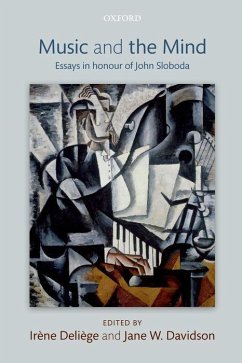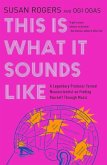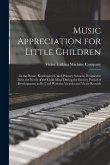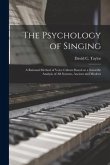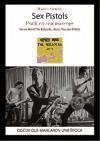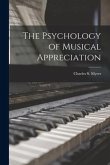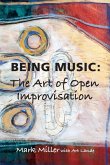Music and the Mind
Essays in Honour of John Sloboda
Herausgeber: Deliege, Irene; Davidson, Jane
Music and the Mind
Essays in Honour of John Sloboda
Herausgeber: Deliege, Irene; Davidson, Jane
- Broschiertes Buch
- Merkliste
- Auf die Merkliste
- Bewerten Bewerten
- Teilen
- Produkt teilen
- Produkterinnerung
- Produkterinnerung
Music and the Mind brings together an outstanding, international team of authorities from the fields of music and psychology, to celebrate the life and work of John Sloboda. In addition the book reviews and takes stock of where the field of music psychology stands 25 years after Sloboda's classic work 'The Musical Mind' first appeared.
Andere Kunden interessierten sich auch für
![This Is What It Sounds Like This Is What It Sounds Like]() Susan RogersThis Is What It Sounds Like15,99 €
Susan RogersThis Is What It Sounds Like15,99 €![Music Appreciation for Little Children: In the Home, Kindergarten, and Primary Schools; Designed to Meet the Needs of the Child Mind During the Sensor Music Appreciation for Little Children: In the Home, Kindergarten, and Primary Schools; Designed to Meet the Needs of the Child Mind During the Sensor]() Music Appreciation for Little Children: In the Home, Kindergarten, and Primary Schools; Designed to Meet the Needs of the Child Mind During the Sensor19,99 €
Music Appreciation for Little Children: In the Home, Kindergarten, and Primary Schools; Designed to Meet the Needs of the Child Mind During the Sensor19,99 €![The Psychology of Singing: a Rational Method of Voice Culture Based on a Scientific Analysis of All Systems, Ancient and Modern The Psychology of Singing: a Rational Method of Voice Culture Based on a Scientific Analysis of All Systems, Ancient and Modern]() The Psychology of Singing: a Rational Method of Voice Culture Based on a Scientific Analysis of All Systems, Ancient and Modern26,99 €
The Psychology of Singing: a Rational Method of Voice Culture Based on a Scientific Analysis of All Systems, Ancient and Modern26,99 €![Sex Pistols : punk en cinemascope : Never mind the bollocks, here's the Sex Pistols Sex Pistols : punk en cinemascope : Never mind the bollocks, here's the Sex Pistols]() Marcos GendreSex Pistols : punk en cinemascope : Never mind the bollocks, here's the Sex Pistols18,99 €
Marcos GendreSex Pistols : punk en cinemascope : Never mind the bollocks, here's the Sex Pistols18,99 €![The Psychology of Musical Appreciation The Psychology of Musical Appreciation]() The Psychology of Musical Appreciation15,99 €
The Psychology of Musical Appreciation15,99 €![Being Music Being Music]() Mark MillerBeing Music20,99 €
Mark MillerBeing Music20,99 €![Balfe: His Life and Work Balfe: His Life and Work]() William Alexander BarrettBalfe: His Life and Work25,99 €
William Alexander BarrettBalfe: His Life and Work25,99 €-
-
-
Music and the Mind brings together an outstanding, international team of authorities from the fields of music and psychology, to celebrate the life and work of John Sloboda. In addition the book reviews and takes stock of where the field of music psychology stands 25 years after Sloboda's classic work 'The Musical Mind' first appeared.
Hinweis: Dieser Artikel kann nur an eine deutsche Lieferadresse ausgeliefert werden.
Hinweis: Dieser Artikel kann nur an eine deutsche Lieferadresse ausgeliefert werden.
Produktdetails
- Produktdetails
- Verlag: Hurst & Co.
- Seitenzahl: 444
- Erscheinungstermin: 1. April 2011
- Englisch
- Abmessung: 234mm x 155mm x 25mm
- Gewicht: 658g
- ISBN-13: 9780199581566
- ISBN-10: 0199581568
- Artikelnr.: 32730982
- Herstellerkennzeichnung
- Libri GmbH
- Europaallee 1
- 36244 Bad Hersfeld
- gpsr@libri.de
- Verlag: Hurst & Co.
- Seitenzahl: 444
- Erscheinungstermin: 1. April 2011
- Englisch
- Abmessung: 234mm x 155mm x 25mm
- Gewicht: 658g
- ISBN-13: 9780199581566
- ISBN-10: 0199581568
- Artikelnr.: 32730982
- Herstellerkennzeichnung
- Libri GmbH
- Europaallee 1
- 36244 Bad Hersfeld
- gpsr@libri.de
Irène Deliège obtained her qualifications at the Royal Conservatory of Brussels. After a twenty year career as a music teacher, she retrained in psychology and obtained her PhD in 1991 from the University of Liège where she was responsible for the Unit of Research in Psychology of Music. A founding member of ESCOM, she has acted since its inception as permanent secretary and Editor of the Journal MUSICÆ SCIENTIÆ. She is the author of several articles and co-edited books dedicated to music perception. Jane Davidson is the current Callaway/Tunely Chair of Music at the University of Western Australia. She has published extensively within psychology of music with research topics including expressive body movement, collaborative performance, music learning and ability, and singing. Her first academic appointment was at University of Keele between 1991-1993, where she worked as a post-doctoral fellow with John Sloboda and Michael Howe on an innovatory study of the biographical determinants of musical abilities. This led to more than 20 joint peer-reviewed publications.
* Prelude
* John Sloboda and his contribution
* 1: Michel Imberty: Music, linguistics and cognition
* 2: Eric Fillenz Clarke: 'What are the important questions?' A
reflection
* Motivating Musical Lives
* 3: Susan O'Neill: Developing a young musician's growth mindset: the
role of motivation, self-theories and resiliency.
* 4: Alexandra Lamont: Negotiating Music in the Real World:
development, motivation, process and effect
* 5: Jane Davidson: Musical Participation: Expectations, Experiences
and Outcomes
* Music and Emotion
* 6: Alf Gabrielsson: How do Strong Experiences with Music (SEM) relate
to experiences in everyday listening to music?
* 7: Patrik N. Juslin: Music and Emotion: Seven Questions, Seven
Answers
* Sloboda's Recall Paradigm
* 8: Mario Baroni, Rossana Dalmonte and Roberto Caterina: Perception of
melody. An empirical approach
* 9: Daniel Muellensiefen and Geraint A. Wiggins: Sloboda's recall
paradigm for melodic memory: A new, computational perspective
* Musical Achievement and Expertise
* 10: Frederick A. Seddon: Musical encounters of the temporary kind
* 11: Antonia Ivaldi: Routes to Adolescent Musical Expertise
* 12: Reinhard Kopiez: The musical child prodigy (Wunderkind) in music
history: A historiometric analysis
* 13: Adam Ockelford: : Evidence from a Savant of how Atonal Music is
Processed in Cognition'
* Examining Musical Performance
* 14: Nicholas J. Cook: Off the record: performance, history, and
musical logic
* 15: Andreas Lehmann: Expressive Variants in the Opening Robert
Schumann's Arlequin (from Carnaval, op. 9): 54 Pianists'
Interpretations of a Metrical Ambiguity
* 16: Geoff Luck: Quantifying the beat-inducing properties of
conductors' temporal gestures, and conductor-musician synchronization
* 17: Jane Ginsborg and Roger Chaffin: Performance cues in singing:
Evidence from practice and recall
* Music and cultural integration
* 18: Arild Bergh: Emotions in motion: Transforming conflict with the
help of music
* 19: Richard Parncutt and Angelika Dorfer: The role of music in the
integration of cultural minorities
* Postlude
* John Sloboda and his contribution
* 1: Michel Imberty: Music, linguistics and cognition
* 2: Eric Fillenz Clarke: 'What are the important questions?' A
reflection
* Motivating Musical Lives
* 3: Susan O'Neill: Developing a young musician's growth mindset: the
role of motivation, self-theories and resiliency.
* 4: Alexandra Lamont: Negotiating Music in the Real World:
development, motivation, process and effect
* 5: Jane Davidson: Musical Participation: Expectations, Experiences
and Outcomes
* Music and Emotion
* 6: Alf Gabrielsson: How do Strong Experiences with Music (SEM) relate
to experiences in everyday listening to music?
* 7: Patrik N. Juslin: Music and Emotion: Seven Questions, Seven
Answers
* Sloboda's Recall Paradigm
* 8: Mario Baroni, Rossana Dalmonte and Roberto Caterina: Perception of
melody. An empirical approach
* 9: Daniel Muellensiefen and Geraint A. Wiggins: Sloboda's recall
paradigm for melodic memory: A new, computational perspective
* Musical Achievement and Expertise
* 10: Frederick A. Seddon: Musical encounters of the temporary kind
* 11: Antonia Ivaldi: Routes to Adolescent Musical Expertise
* 12: Reinhard Kopiez: The musical child prodigy (Wunderkind) in music
history: A historiometric analysis
* 13: Adam Ockelford: : Evidence from a Savant of how Atonal Music is
Processed in Cognition'
* Examining Musical Performance
* 14: Nicholas J. Cook: Off the record: performance, history, and
musical logic
* 15: Andreas Lehmann: Expressive Variants in the Opening Robert
Schumann's Arlequin (from Carnaval, op. 9): 54 Pianists'
Interpretations of a Metrical Ambiguity
* 16: Geoff Luck: Quantifying the beat-inducing properties of
conductors' temporal gestures, and conductor-musician synchronization
* 17: Jane Ginsborg and Roger Chaffin: Performance cues in singing:
Evidence from practice and recall
* Music and cultural integration
* 18: Arild Bergh: Emotions in motion: Transforming conflict with the
help of music
* 19: Richard Parncutt and Angelika Dorfer: The role of music in the
integration of cultural minorities
* Postlude
* Prelude
* John Sloboda and his contribution
* 1: Michel Imberty: Music, linguistics and cognition
* 2: Eric Fillenz Clarke: 'What are the important questions?' A
reflection
* Motivating Musical Lives
* 3: Susan O'Neill: Developing a young musician's growth mindset: the
role of motivation, self-theories and resiliency.
* 4: Alexandra Lamont: Negotiating Music in the Real World:
development, motivation, process and effect
* 5: Jane Davidson: Musical Participation: Expectations, Experiences
and Outcomes
* Music and Emotion
* 6: Alf Gabrielsson: How do Strong Experiences with Music (SEM) relate
to experiences in everyday listening to music?
* 7: Patrik N. Juslin: Music and Emotion: Seven Questions, Seven
Answers
* Sloboda's Recall Paradigm
* 8: Mario Baroni, Rossana Dalmonte and Roberto Caterina: Perception of
melody. An empirical approach
* 9: Daniel Muellensiefen and Geraint A. Wiggins: Sloboda's recall
paradigm for melodic memory: A new, computational perspective
* Musical Achievement and Expertise
* 10: Frederick A. Seddon: Musical encounters of the temporary kind
* 11: Antonia Ivaldi: Routes to Adolescent Musical Expertise
* 12: Reinhard Kopiez: The musical child prodigy (Wunderkind) in music
history: A historiometric analysis
* 13: Adam Ockelford: : Evidence from a Savant of how Atonal Music is
Processed in Cognition'
* Examining Musical Performance
* 14: Nicholas J. Cook: Off the record: performance, history, and
musical logic
* 15: Andreas Lehmann: Expressive Variants in the Opening Robert
Schumann's Arlequin (from Carnaval, op. 9): 54 Pianists'
Interpretations of a Metrical Ambiguity
* 16: Geoff Luck: Quantifying the beat-inducing properties of
conductors' temporal gestures, and conductor-musician synchronization
* 17: Jane Ginsborg and Roger Chaffin: Performance cues in singing:
Evidence from practice and recall
* Music and cultural integration
* 18: Arild Bergh: Emotions in motion: Transforming conflict with the
help of music
* 19: Richard Parncutt and Angelika Dorfer: The role of music in the
integration of cultural minorities
* Postlude
* John Sloboda and his contribution
* 1: Michel Imberty: Music, linguistics and cognition
* 2: Eric Fillenz Clarke: 'What are the important questions?' A
reflection
* Motivating Musical Lives
* 3: Susan O'Neill: Developing a young musician's growth mindset: the
role of motivation, self-theories and resiliency.
* 4: Alexandra Lamont: Negotiating Music in the Real World:
development, motivation, process and effect
* 5: Jane Davidson: Musical Participation: Expectations, Experiences
and Outcomes
* Music and Emotion
* 6: Alf Gabrielsson: How do Strong Experiences with Music (SEM) relate
to experiences in everyday listening to music?
* 7: Patrik N. Juslin: Music and Emotion: Seven Questions, Seven
Answers
* Sloboda's Recall Paradigm
* 8: Mario Baroni, Rossana Dalmonte and Roberto Caterina: Perception of
melody. An empirical approach
* 9: Daniel Muellensiefen and Geraint A. Wiggins: Sloboda's recall
paradigm for melodic memory: A new, computational perspective
* Musical Achievement and Expertise
* 10: Frederick A. Seddon: Musical encounters of the temporary kind
* 11: Antonia Ivaldi: Routes to Adolescent Musical Expertise
* 12: Reinhard Kopiez: The musical child prodigy (Wunderkind) in music
history: A historiometric analysis
* 13: Adam Ockelford: : Evidence from a Savant of how Atonal Music is
Processed in Cognition'
* Examining Musical Performance
* 14: Nicholas J. Cook: Off the record: performance, history, and
musical logic
* 15: Andreas Lehmann: Expressive Variants in the Opening Robert
Schumann's Arlequin (from Carnaval, op. 9): 54 Pianists'
Interpretations of a Metrical Ambiguity
* 16: Geoff Luck: Quantifying the beat-inducing properties of
conductors' temporal gestures, and conductor-musician synchronization
* 17: Jane Ginsborg and Roger Chaffin: Performance cues in singing:
Evidence from practice and recall
* Music and cultural integration
* 18: Arild Bergh: Emotions in motion: Transforming conflict with the
help of music
* 19: Richard Parncutt and Angelika Dorfer: The role of music in the
integration of cultural minorities
* Postlude

